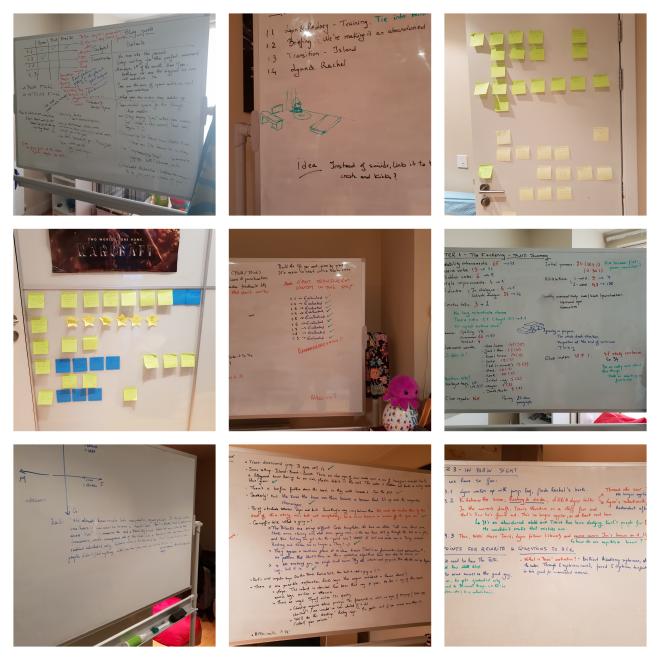Five Things I Learned Writing My First Book
Table of Contents
I’ve always wanted to write a book. Before I became an actual AuthorTM (I have a book on Amazon and everything), I had about a dozen false starts, including several fan novels, a bunch of stories that died before they hit the 5,000 word mark, and enough teaching moments to fill another book.
Today, I’m sharing five things I learned in bringing Gifted to the world.
‘Gifted’ cover artwork by Nicholas Kay.
1. Know what you don’t know. #
This goes for technique, plot, characters, and anything else that’s not directly grounded in your lived experience up to this point.
I used to be the kind of writer who thought themself above all advice. My book was good because it made me feel good. In other words, I was mistaking how I felt the story with what was on the page and couldn’t understand why my words didn’t make readers feel the same way that I did.
What I didn’t know at the time was how to capture that magic that was going on in my head and share it with anyone else. To do that, I had to learn the ins and outs of storywriting–plot, conflict, dialogue, etc. These were all things I thought I knew (we’d all learned them in school, after all1).
Just because I knew what stuff was called didn’t mean I also knew what it was or how to use it properly. Did I know the actual principles of good dialogue? Not really, but I knew that dialogue had principles, so I figured I’d wing it and my genius would get me through. (Spoiler alert: I didn’t.)
Looking back, the end result was predictable: a bland protagonist who didn’t drive the plot but kinda drifted along with it, a supporting cast stuck somewhere between “sassy cardboard cutout” and Gary Stu, and a bunch of scenes that might have been fun to write but didn’t really connect. I even had a Wikipedia Guy whose sole purpose was to explain how everything worked. This being sci-fi, there was a lot to explain.
I queried this monstrosity somewhere around ‘12. Out of my 30 queries or so, only a few agents responded with generic variations of no thanks. I was so demoralized I dropped the book altogether and didn’t pick it up again until about four years later.
Which brings me to my next point…
2. Reframe, rewrite, then try again, #
When I revisited Gifted in 2016, I thought I’d stumbled on to something. Four years, three fan novels and a lot of reading had taught me a lot about prose and structure (more on that below). I wrote a few scenes that were miles ahead of everything else I’d produced so far and even saw some glimpses of things that later became major plot points.
This fresh burst of creativity fizzled out when I realized the sheer enormity of having to rewrite a whopping 78,000-word manuscript (again) while living under less than ideal conditions2 and dealing with a clinical depression episode on top of it.
A year later, I was so demoralized with the story that I even considered giving up on the whole thing. That lasted until I accidentally deleted the manuscript and scrambled to find a way to recover it (thank Dropbox for its cloud backups, otherwise I’d still be stuck re-re-re-rewriting).
At that point, I knew I had to finish this book.
I got a whiteboard, bought a bunch of sticky notes, and painstakingly went through the whole book again, scene by scene, evaluating what worked and what didn’t.
This is what my room looked like for the next few months:

And here’s what I found:
-
I had a lot of scenes where characters sat around talking about the plot, but not actually moving the plot. It wasn’t as bad as the ole “characters telling each other things they already know for the benefit of the reader” trope, but it came close.
-
My protagonist went from place to place and from world to world, but rarely did anything more than watch things happen and offer the occasional quip. She started off shy and awkward and never really grew out of that.
-
I’d also made my hyper-competent multiversal totally-not-MIB look like a bunch of idiots more than once. They had no idea what was going on because I, the writer, also didn’t know what was going on, and that was because I’d never bothered to map the whole story out.
-
I’d crammed way too much stuff in one book. I had spaceship battles, teleportation, parallel worlds, a boot camp for the Multiverse Police, a play on the Chosen One trope… the list goes on.
The biggest problem, though, was that the story didn’t go anywhere. Things happened, sure, but they weren’t necessarily stemming from, or being caused by, other things that happened before. Once I knew that, I knew what I had to do.
3. Writing a book is a marathon, not a sprint. #
Going slow and steady is critical. If you try to get the whole thing done in one go, you’re going to run out of steam before you run out of book to (re)write.
Which means you’ll have to build a habit to write, then do it consistently until you can’t not do it. Sir Terry Pratchett wrote 400 words every day, come hell or high water or a funeral3. If you ever did NaNoWriMo, you’ll have at least tried to hit 1600 words a day for a whole month. (Major kudos to you if you did.)
For me, the happy number is somewhere in-between. Some days I write one to two thousand words easily, other days I struggle to make it to 400. Whatever happens, though, I always, always go for that 400 minimum. It’s a habit I’ve honed over the past few years, and it’s how my second book took two years to write all in all, while Gifted took eight.
If you build the habit of writing every day, you won’t be beholden to fickle things like inspiration or getting in the mood. It’s nice to write while in a state of flow, but you should train yourself to write independent of it.
4. Prep isn’t writing. Writing is writing. #
This might go against the conventional wisdom #AmWriting Twitter loves to preach, but if you want to write a book, you need to write the book. Yeah, you need to outline the plot, do some worldbuilding, make a moodboard, or whatever else helps you figure out the shape of the story you want to tell.
That’s not writing, though. That’s prep. And, while prep is just as important, if you spend the majority of your time and creative energy doing it, you’ll never get your book off the ground.
For Gifted, I had a whole wiki with every character’s detailed backstory, a detailed summary of every chapter (with cross-linking where applicable), a brief history of Third, a glossary, moodboards for each of the five principal characters, a TV Tropes page… you get the picture. Far from being active procrastination, this was my way of convincing myself I was making progress.
Except I wasn’t.

Commissioning fanart isn’t writing either, but I had to share this piece of Lynn and Rachel that I commissioned on a now-defunct forum because I love these two so much.
At the end of the day, putting words on the page (or screen) is the only way you’ll get the actual book done, even if you end up scraping 90% of the first draft when you revise (I did).
“But wait,” you might say, “isn’t that whole business with the sticky notes kinda procrastinating, too?”
Not really. A lot of that was me figuring out how to revise (not write) in a way that made sense to how my brain works. Different writers revise differently or, by virtue of some black magic fuckery, get it 90% right from the first draft. Sadly, that ain’t me.
Which brings me to the single most important thing I realized while re-re-rewriting this book:
5. Your first draft is going to suck, and that’s okay. #
I’m not talking about “och, there’s a typo” levels of suck. I’m talking “yeet this whole thing into the sun and start again.”
And that’s okay.
As my friend and Gifted editor Damien Owens4 once put it, the first draft is you telling yourself the story. Even if you think you know the story you’re going to tell, I promise you that you don’t. Not really.
You might find yourself halfway through the book when you suddenly come up with a better and more exciting opening act. Or, you might think you know who the villain is, but when you get to the big reveal, a far more shocking twist presents itself, and then you need to go back to what you already wrote and plant enough foreshadowing that the reveal doesn’t feel contrived.
That’s what happened with Gifted: I thought I had my villain, wrote him in, planted all the clues that led our heroes right to them… and then, one fine day as I was pottering around in the kitchen, I thought, “What if [spoiler] was the Bigger Bad?” And then, I had to go back and foreshadow that, too.
My original writing process was a multi-step writing/editing workflow that went something like this:
- Write a scene on paper.
- Type up the scene in Word, revising as I went.
- Repeat the same process for all scenes in a chapter.
- Go back and re-read/revise the entire chapter.
- Do one last proofing pass on that chapter before moving on to the next.
That’s not the kind of process that lends itself to revising, not to mention it’s far too lenghty and tedious for a first draft. What I tend to do these days is YOLO my way through the first draft, leaving myself little comments and notes as I go, to the tune of:
REWRITE NOTE: Jane Doe’s name is now Jeannie Moe.
If I’d been calling her Jane Doe up to that point, that’s fine; I’ll fix it when I revise. Or maybe I’ll decide to call her Jean Roe instead. Either way, I don’t stop writing to start revising.
All this might look like it amounts to a lot of wasted effort. It doesn’t. You can’t see the story you’re trying to tell until you get the whole thing out of your head and on paper or onto the screen. Only then, you can start to refine it.
-
Creative writing (in Romanian) was an integral part of the Romanian school curriculum when I was growing up. ↩︎
-
The heating in our flat didn’t work and the bedroom window didn’t close properly. We slept in our sweaters that winter and got the hell out of there as soon as we found someplace else. Slumlords can get fucked. ↩︎
-
In Seriously Funny: The Endlessly Quotable, a book of essays that every writer should read. ↩︎
-
Damien himself is an accomplished author and screenwriter. You can find him on Mastodon and (formerly) Twitter, wherein his last tweet reads, Elon Musk could start a colony on Mars just in time to save humanity from an asteroid that destroys the Earth and I would still sit there in my little spacesuit saying ‘Yeah, but he ruined Twitter, so fuck him.’ ↩︎